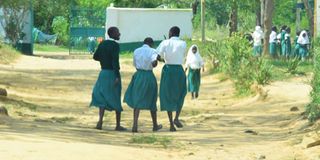The monthly calculation: How period poverty continues to shape gender education gap

Pupils go for break. Period poverty forces many girls to skip school, use rags, or give in to male sexual predators to get money for pads.
What you need to know:
- Forty per cent of recipients report government-supplied sanitary products are insufficient.
- Despite a law mandating free sanitary towels for pubescent girls in public schools, a recent Senate committee rejected a bill seeking to guarantee quality menstrual products, citing burden on taxpayers.
- The Nguvu Collective and Kewopa report reveals widespread exploitation, transactional sex, and educational inequality affecting 3.7 million vulnerable girls.
The clock ticks relentlessly toward midday at a rural school in Laikipia County. While her classmates prepare for afternoon lessons, 17-year-old Alice Siran sits alone, anxiety etched across her face. It's that time of the month again – a period that should be merely biological but has become an economic and educational catastrophe.
Each month brings the same impossible calculation: attend school and risk humiliation, or miss critical lessons and fall behind. The solution? Often nothing more dignified than borrowed protection from friends who can spare it.
"Many times, I am forced to borrow sanitary towels from friends," Alice confides. "My parents fail to raise money, more so during drought, when a lot of animals die."
In Kenya's vastly different landscapes – from Matigari village where Alice's pastoralist parents struggle to maintain their livelihood, to the dense urban sprawl of Kibra in Nairobi – the story repeats with devastating predictability.
"A lot of times when I am on my menses, getting sanitary pads is a problem as my mother, in many instances, lacks the money to buy them for me," says 16-year-old Carol Achieng*, whose only recourse is assistance from Kirta Touch the Needy, an NGO providing sanitary towels to girls in Nairobi's largest informal settlement.
These aren't mere inconveniences. They represent a nationwide education crisis hiding in plain sight – one that silently undermines Kenya's future by pushing girls out of classrooms for up to six weeks each academic year.
Mathematics of missed opportunity
The numbers tell a devastating story of educational inequality. According to the Ministry of Education, a girl who misses four days in a 28-day cycle loses 13 learning days – equivalent to two full weeks every school term.
This absence creates a cumulative educational debt that grows insurmountable. Studies reveal girls from disadvantaged backgrounds miss a staggering 20 per cent of school days annually due to inadequate menstrual supplies. For a primary schoolgirl in grades 6-8, this translates to 18 learning weeks lost out of a possible 108.
By the time she completes secondary education, a girl may have sacrificed 156 learning days – almost 24 weeks out of 144 weeks of potential learning – all because of a natural biological function.
A broken promise
In 2011, the government recognised this crisis and launched the School Sanitary Towel Program under the Ministry of Education to provide menstrual products to vulnerable girls. The Basic Education (Amendment) Act 2017 further cemented this commitment, requiring free, sufficient, and quality sanitary towels for every girl who has reached puberty in public schools.
Yet, a comprehensive report by Nguvu Collective and Kenya Women Parliamentary Association (Kewopa) titled "Echoing Voices from the Grassroots on Dignified Period for All" reveals a grim reality: 40 per cent of recipients report the government supply is woefully insufficient.
Auditor General Nancy Gathungu has raised concerns about the program's implementation, confirming that "the pack distributed is insufficient" to meet girls' monthly needs.
Beyond education
The report uncovers more sinister outcomes of period poverty. Cases of transactional sex in exchange for sanitary products, increased school dropouts, and deepening gender inequalities have become common realities for those unable to afford basic menstrual supplies.
The vulnerability is heightened for specific groups. "Schoolchildren, those living in rural areas, and people living with disabilities often face the harshest impact," the report states. "They are not only struggling with affordability but also becoming more susceptible to exploitation and abuse."
For the estimated 3.7 million girls in public primary schools, special primary and secondary schools requiring sanitary towels, the marketplace offers little relief.
The Nguvu Collective and Kewopa research – which surveyed more than 9,500 women and girls across 45 counties – found that four in ten struggle with prohibitively high sanitary pad prices. More than 45 per cent report insufficient retail access, with not enough shops in their areas selling menstrual products.
When making purchasing decisions, women prioritise functionality over cost: 53 per cent choose based on absorbency, 48 per cent on comfort, and 44 per cent on skin sensitivity. Only 19 per cent select products based primarily on price – suggesting they make sacrifices elsewhere to afford adequate protection.
Political disappointment
Hope for improvement was crushed in December 2024, when a Senate committee rejected the Provision of Sanitary Towels Bill, 2024. The proposed legislation aimed to guarantee quality, free, and sufficient sanitary towels in public institutions and correctional facilities.
The Labour and Social Welfare Committee justified their decision by claiming: "The committee received more than 90 submissions on the Bill, with a majority recommending the rejection of the Bill." They cited concerns that the proposal would add "additional burden to the burdened taxpayers."
For Alice, Carol, and millions like them across Kenya, this political failure means another year of borrowed protection, missed classes, and diminished opportunity – all because of a natural biological function they cannot control.
*Names changed to protect privacy of the girls.
dmaichuhie@ke.nationmedia.com
